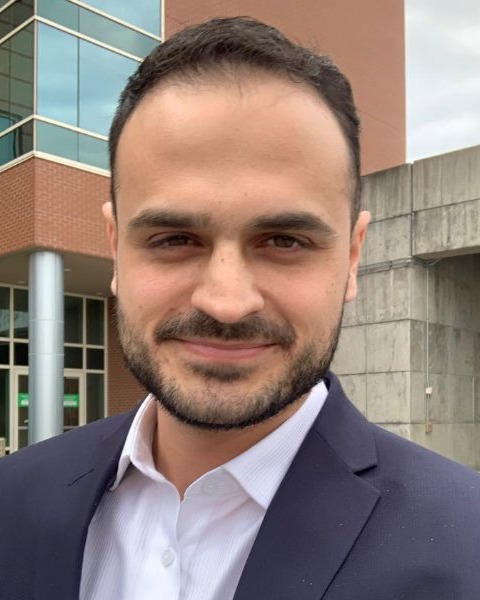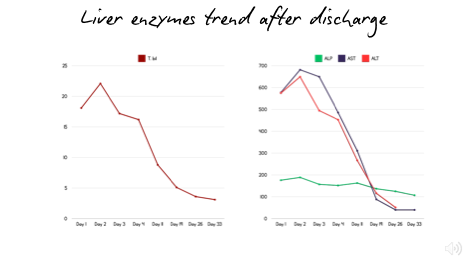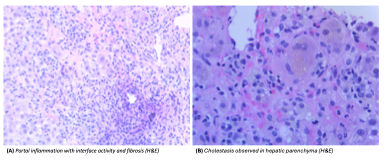Tuesday Poster Session
Category: Liver
P5984 - An Uncommon Link: Autoimmune Hepatitis Following Doxycycline Therapy
Tuesday, October 28, 2025
10:30 AM - 4:00 PM PDT
Location: Exhibit Hall

Khawaja Hassam, MD (he/him/his)
Lahey Hospital and Medical Center
Woburn, MA
Presenting Author(s)
Khawaja Hassam, MD1, Romelia A. Barba Bernal, MD2, Jerapas Thongpiya, MD2, Rubab Rizwan, MD3, Ana Marenco, MD4, Zeyad Elharabi, MBBS, MS2, Luis Brandi, MD2, Nebiyou Wondimagegnehu, MD2
1Lahey Hospital and Medical Center, Woburn, MA; 2Texas Tech University Health Sciences Center, Lubbock, TX; 3Vassar Brothers Medical Center, Poughkeepsie, NY; 4Beth Israel Deaconess Medical Center, Boston, MA
Introduction: Drug-induced autoimmune hepatitis (DI-AIH) is a rare but important cause of acute liver injury. Although more commonly associated with minocycline, other antibiotics such as doxycycline have been implicated. Early recognition is critical, as DI-AIH can resemble classic autoimmune hepatitis but may resolve with drug withdrawal alone. This case illustrates the clinical features, diagnostic workup, and spontaneous resolution of DI-AIH in a patient following a short course of doxycycline.
Case Description/
Methods: A 63-year-old man with a history of hypertension, CKD, BPH, morbid obesity, and gout presented with a one-week history of jaundice, dark urine, acholic stools, pruritus, and fatigue. Two weeks prior, he had completed a 7-day course of doxycycline for acute prostatitis. He denied alcohol use, herbal supplements, or other recent medication changes.
Initial labs revealed total bilirubin of 18.2 mg/dL, AST 578 U/L, ALT 575 U/L, ALP 176 U/L, and INR 1.28. Abdominal imaging showed hepatic steatosis without biliary obstruction. Workup for viral hepatitis was negative. Autoimmune panel revealed positive ANA, elevated IgG (2500 mg/dL), and marginally positive ASMA. Liver biopsy demonstrated moderate portal inflammation with interface hepatitis, Mallory-Denk bodies, mild steatosis, and stage 2–3 fibrosis—findings consistent with autoimmune hepatitis. Given the temporal relationship to doxycycline, a diagnosis of DI-AIH was favored. Doxycycline and diclofenac were discontinued. Although prednisone was initiated, it was held after one dose as liver enzymes began trending down spontaneously.
At follow-up, liver tests normalized (AST 40 U/L, ALT 37 U/L, bilirubin 3.1 mg/dL), and symptoms resolved. The patient was counseled to avoid doxycycline and was scheduled for repeat imaging.
Discussion: Diagnosing DI-AIH can be tricky because its presentation often mimics other types of liver injury. In this case, doxycycline appeared to be the likely culprit, raising awareness of its role in triggering autoimmune-like reactions—especially in patients with other risk factors like fatty liver or multiple medications. The diagnosis came into focus after correlating the timing of symptoms with autoimmune markers and liver biopsy findings. In contrast to classic autoimmune hepatitis, the liver injury resolved after discontinuing the medication, without the need for long-term immunosuppression. Early recognition and appropriate management are key to preventing disease progression and avoiding unnecessary therapies.

Figure: Figure 1. Liver Biopsy Findings in Doxycycline-Induced Autoimmune Hepatitis
(A) Hematoxylin and eosin stain showing moderate portal inflammation with a mixed infiltrate of neutrophils, plasma cells, and eosinophils, along with interface activity, moderate lobular inflammation, mild macrovesicular steatosis, and stage 2–3 fibrosis. No iron or alpha-1-antitrypsin globules are seen.

Figure: Figure 2. Liver Enzyme Trend Following Discharge
Serial measurements showing a progressive decline in total bilirubin (T.bil), alanine aminotransferase (ALT), aspartate aminotransferase (AST), and alkaline phosphatase (ALP) following cessation of doxycycline. The spontaneous normalization of liver tests supports the diagnosis of drug-induced autoimmune hepatitis without the need for prolonged immunosuppressive therapy.
Disclosures:
Khawaja Hassam indicated no relevant financial relationships.
Romelia Barba Bernal indicated no relevant financial relationships.
Jerapas Thongpiya indicated no relevant financial relationships.
Rubab Rizwan indicated no relevant financial relationships.
Ana Marenco indicated no relevant financial relationships.
Zeyad Elharabi indicated no relevant financial relationships.
Luis Brandi indicated no relevant financial relationships.
Nebiyou Wondimagegnehu indicated no relevant financial relationships.
Khawaja Hassam, MD1, Romelia A. Barba Bernal, MD2, Jerapas Thongpiya, MD2, Rubab Rizwan, MD3, Ana Marenco, MD4, Zeyad Elharabi, MBBS, MS2, Luis Brandi, MD2, Nebiyou Wondimagegnehu, MD2. P5984 - An Uncommon Link: Autoimmune Hepatitis Following Doxycycline Therapy, ACG 2025 Annual Scientific Meeting Abstracts. Phoenix, AZ: American College of Gastroenterology.
1Lahey Hospital and Medical Center, Woburn, MA; 2Texas Tech University Health Sciences Center, Lubbock, TX; 3Vassar Brothers Medical Center, Poughkeepsie, NY; 4Beth Israel Deaconess Medical Center, Boston, MA
Introduction: Drug-induced autoimmune hepatitis (DI-AIH) is a rare but important cause of acute liver injury. Although more commonly associated with minocycline, other antibiotics such as doxycycline have been implicated. Early recognition is critical, as DI-AIH can resemble classic autoimmune hepatitis but may resolve with drug withdrawal alone. This case illustrates the clinical features, diagnostic workup, and spontaneous resolution of DI-AIH in a patient following a short course of doxycycline.
Case Description/
Methods: A 63-year-old man with a history of hypertension, CKD, BPH, morbid obesity, and gout presented with a one-week history of jaundice, dark urine, acholic stools, pruritus, and fatigue. Two weeks prior, he had completed a 7-day course of doxycycline for acute prostatitis. He denied alcohol use, herbal supplements, or other recent medication changes.
Initial labs revealed total bilirubin of 18.2 mg/dL, AST 578 U/L, ALT 575 U/L, ALP 176 U/L, and INR 1.28. Abdominal imaging showed hepatic steatosis without biliary obstruction. Workup for viral hepatitis was negative. Autoimmune panel revealed positive ANA, elevated IgG (2500 mg/dL), and marginally positive ASMA. Liver biopsy demonstrated moderate portal inflammation with interface hepatitis, Mallory-Denk bodies, mild steatosis, and stage 2–3 fibrosis—findings consistent with autoimmune hepatitis. Given the temporal relationship to doxycycline, a diagnosis of DI-AIH was favored. Doxycycline and diclofenac were discontinued. Although prednisone was initiated, it was held after one dose as liver enzymes began trending down spontaneously.
At follow-up, liver tests normalized (AST 40 U/L, ALT 37 U/L, bilirubin 3.1 mg/dL), and symptoms resolved. The patient was counseled to avoid doxycycline and was scheduled for repeat imaging.
Discussion: Diagnosing DI-AIH can be tricky because its presentation often mimics other types of liver injury. In this case, doxycycline appeared to be the likely culprit, raising awareness of its role in triggering autoimmune-like reactions—especially in patients with other risk factors like fatty liver or multiple medications. The diagnosis came into focus after correlating the timing of symptoms with autoimmune markers and liver biopsy findings. In contrast to classic autoimmune hepatitis, the liver injury resolved after discontinuing the medication, without the need for long-term immunosuppression. Early recognition and appropriate management are key to preventing disease progression and avoiding unnecessary therapies.

Figure: Figure 1. Liver Biopsy Findings in Doxycycline-Induced Autoimmune Hepatitis
(A) Hematoxylin and eosin stain showing moderate portal inflammation with a mixed infiltrate of neutrophils, plasma cells, and eosinophils, along with interface activity, moderate lobular inflammation, mild macrovesicular steatosis, and stage 2–3 fibrosis. No iron or alpha-1-antitrypsin globules are seen.

Figure: Figure 2. Liver Enzyme Trend Following Discharge
Serial measurements showing a progressive decline in total bilirubin (T.bil), alanine aminotransferase (ALT), aspartate aminotransferase (AST), and alkaline phosphatase (ALP) following cessation of doxycycline. The spontaneous normalization of liver tests supports the diagnosis of drug-induced autoimmune hepatitis without the need for prolonged immunosuppressive therapy.
Disclosures:
Khawaja Hassam indicated no relevant financial relationships.
Romelia Barba Bernal indicated no relevant financial relationships.
Jerapas Thongpiya indicated no relevant financial relationships.
Rubab Rizwan indicated no relevant financial relationships.
Ana Marenco indicated no relevant financial relationships.
Zeyad Elharabi indicated no relevant financial relationships.
Luis Brandi indicated no relevant financial relationships.
Nebiyou Wondimagegnehu indicated no relevant financial relationships.
Khawaja Hassam, MD1, Romelia A. Barba Bernal, MD2, Jerapas Thongpiya, MD2, Rubab Rizwan, MD3, Ana Marenco, MD4, Zeyad Elharabi, MBBS, MS2, Luis Brandi, MD2, Nebiyou Wondimagegnehu, MD2. P5984 - An Uncommon Link: Autoimmune Hepatitis Following Doxycycline Therapy, ACG 2025 Annual Scientific Meeting Abstracts. Phoenix, AZ: American College of Gastroenterology.
